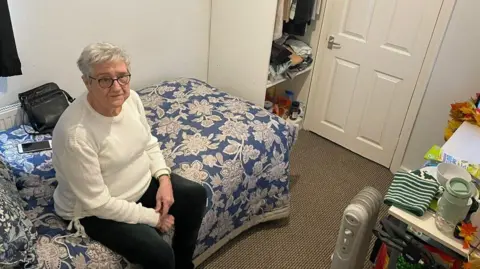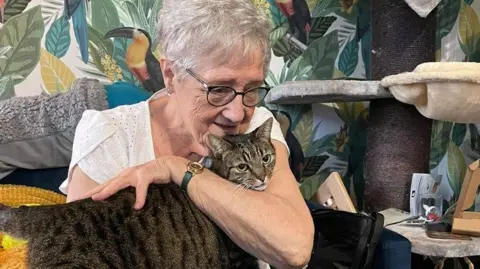
 Emma Curtis
Emma Curtis
Susan Curtis says she cannot cook or wash in this hotel room she currently lives in
Aged 75, Susan Curtis would like to be living a comfortable and dignified life.
But homeless and hopeless, she spends her days struggling to serve her basic needs in a tiny hotel room in Romford, east London.
Homelessness is, by some measures, at record levels. The number of rough sleepers in England stood at 1,768 in 2010. After that the numbers rose, peaking in 2017. The latest official figures put it at 3,898 - 120% higher than in 2010.
Susan has no proper cooking facilities, is in poor health, with a lung disease and in need of a hip replacement. She is also now a victim of London's housing crisis.
She says she lives in fear that things will get even worse, that she will end up on the street.
"I don't like being here, I feel hopeless and scared of the consequences that they are holding over my head with the threat of throwing me out, so I am on edge."
This life has come as a shock to Susan.
Until August, she lived in a privately-rented maisonette - it was full of her own furniture, personal items and her beloved cat Charlie.
But like a rising number of others, Susan's landlady sold up, forcing Susan to leave her home of 13 years.
"It was a shock," she recalls.
"All of my furniture had to go into storage and I'm a bit of a painter - I have some large paintings that I've done.
"My furniture is all hand finished by me and I lost all that."
'Feeding myself is practically impossible here'
Living on a state pension and disability benefits, and faced with rising London rents, she found herself unable to find another private tenancy.
"I'm unacceptable to housing agents, they simply wouldn't take me on," says Susan.
So she turned to her local authority to put a roof over her head.
Councils have a legal duty to house the homeless. But with an estimated 183,000 people in London living in temporary digs supplied by their local authorities, this small hotel room was the best Havering Council could offer her.
Opposite her single bed, within touching distance, sits a microwave, her only means of food preparation.
But there are only so many ready meals she can stomach, she says.
"Feeding myself is practically impossible here, I just have fruit and biscuits until I can get to my daughter's for a proper dinner."
There is no sink in the room, so any washing up has to be done in the small bathroom wash basin.
The basin is also where she washes herself, because a large step to get into the shower makes it impossible for her to use, she says.
With no washing machine, she says she has to rely on others to do her laundry.

 Emma Curtis
Emma Curtis
Susan says she cannot move in with her daughter Emma as it would leave them both at risk of eviction
Luckily, this hotel is just a few miles from her daughter Emma's home, where Susan is regularly welcomed for hot meals, company and access to mod cons.
Susan has no idea how long she will be living like this.
It is a situation she says she cannot see a way out of.
"It's a brutal system and I feel ill-equipped to deal with it," Susan says.
Susan is currently among 2,500 on Havering Council's waiting list for a permanent home.
But, she is worried she will feel forced into accepting a home that is no better than the hotel room - or she will be "turned out on to the street".
She says she should be in sheltered accommodation but believes she is "at the bottom of the list" to be considered for vacancies when they arise.

 Emma Curtis
Emma Curtis
Susan says she hopes she can keep her beloved cat Charlie in any new home she moves to
When asked if she could move in with her daughter and grandson, she said it was not an option as it would break her daughter's tenancy agreement at her council home and lead to them all being evicted.
She also does not want to put Emma, who is undergoing treatment for cancer, under any extra strain.
Havering Council told the BBC that the reason for Susan's homelessness was due to her private landlord evicting her, an issue on the rise.
It said caseworkers were trying to secure her a sheltered housing unit, but said it could take up to a year.
A spokesperson said: “Like many councils across the country, Havering is facing a housing crisis.
"Therefore while we do all we can to place residents within their existing communities and networks - due to the chronic shortage of housing and unprecedented demand - sadly this is not always possible.”
More on London's housing crisis

 3 weeks ago
8
3 weeks ago
8









